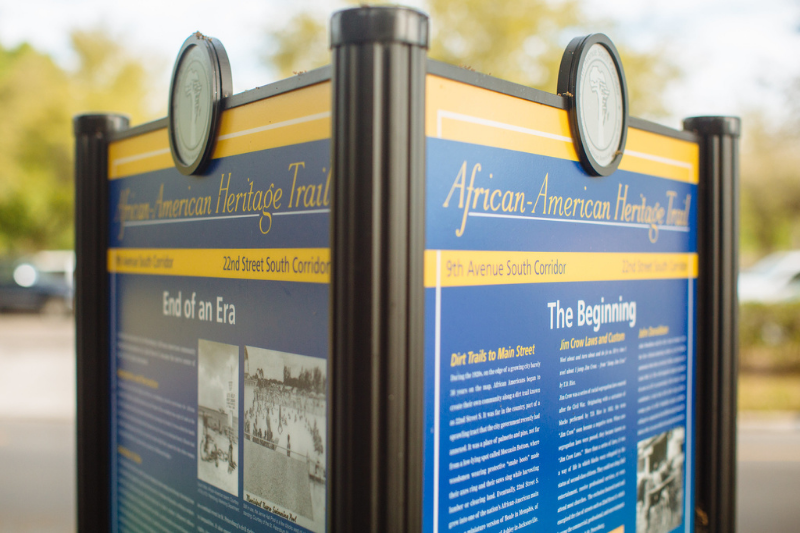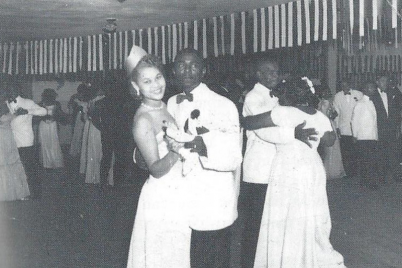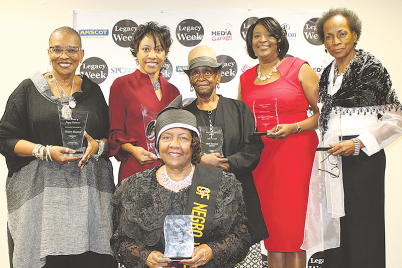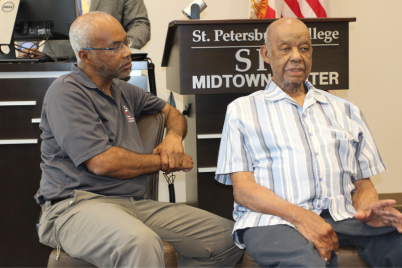Thanks to a nearly $60,000 grant from the Foundation for a Healthy St. Petersburg and a partnership with the Florida Holocaust Museum, the African American Heritage Trail will be available as a guided, app-style digital tour and a YouTube series.
BY THE AFRICAN AMERICAN HERITAGE ASSOCIATION OF ST. PETERSBURG
ST. PETERSBURG — Mrs. Mattie Bennett, 97, was one of only five Black nurses in the City of St. Petersburg when Mercy Hospital was in operation.
Fannye Ayer Ponder, said Thelma Bruce and Ethel Robinson, was good friends with Dr. Mary McLeod Bethune and Eleanor Roosevelt when she was inspired to start a local chapter of the National Council for Negro Women.
Mr. Ron Gregg, a local drummer, remembers hearing the melodies of Louis Armstrong, Duke Ellington, and Ray Charles streaming in through the windows of his home, which was just a few doors down from the historic Manhattan Casino.
These are just a few snippets of the vibrant history of St. Petersburg’s Black community. These are some of the stories narrated by the African American Heritage Association’s Gwendolyn Reese and Jon Wilson over the past five years through walking and trolley tours.
Soon, these stories will be available digitally, making them accessible to anyone, anywhere interested in learning more about the history of the African-American community in St. Petersburg.
Thanks to a nearly $60,000 grant from the Foundation for a Healthy St. Petersburg and a partnership with the Florida Holocaust Museum, the African American Heritage Trail will be available as a guided, app-style digital tour and a YouTube series. The trail will also have a landing page on Visit St. Petersburg-Clearwater’s website.
Carl Lavender, chief equity officer at the Foundation for a Healthy St. Petersburg, said the project is an essential step in enhancing and preserving the community’s Black history.
“Actively listening and learning and engaging with the community often yields life-changing perspectives and will encourage audiences to explore more,” he said.
Reese, the association’s president, calls the endeavor a dream come true, noting that while a digital version of the trail was always part of the plan, the COVID-19 pandemic put the need front and center.
Community partnership, she said, made the dream a reality.
“All my life, I have been very intentional about networking beyond my community and personal circle to partner with other organizations,” Reese explained. “This project, like so many others, speaks to people being able to work together, regardless of mission. It’s also a perfect model to the community to show that various organizations can work together on a project.”
The African American Heritage Trail came to be because of many great partnerships, she continued. Jason Mathis of the Downtown St. Petersburg Partnership donated the trolleys to the African American Heritage Association, making trolley tours possible alongside the walking tours.
That partnership, she said, was spurred by an existing partnership with Veatrice Farrell and the Deuces Live.
The African American Heritage Association has long partnered with The Florida Holocaust Museum on various projects. Elizabeth Gelman, the museum’s executive director, said working together once again was an easy decision to make.
“We are so proud to host the walking tour for the African American Heritage Trail on the Museum’s mobile guide platform,” she said. “Founder Gwendolyn Reese and her team were critical partners as the museum researched and developed Beaches, Benches, and Boycotts, and we are honored to help bring more awareness to this important community resource.”
With the money from the Foundation and the software from the Florida Holocaust Museum, which was in part underwritten by Lorna Taylor, president and CEO of Premier Eye Care, the Heritage Trail will be accessible in a whole new way.
Thanks to the collaboration with Visit St. Petersburg-Clearwater, which will put up a landing page dedicated solely to the trail, news of the trail will reach far and wide.
“We are so excited about the expanded audience that we will reach,” Reese said. “We’re going from 20 people on a trolley to reaching people anywhere on planet earth. Any time of day or night, people will have access to a tour of the trail.”
Most importantly, says Reese, the trail will now be accessible as an educational tool right here in the city. A supporter of local history being shared in schools, Reese has long been dedicated to making sure St. Petersburg’s Black history is accessible to local teachers and students.
The trail was a sought-after field trip destination for local teachers, but issues such as field trip costs and bussing created barriers.
“The digitization provides the perfect opportunity to bring the history of the African- American community into the classrooms in the Pinellas County School system,” Reese said. “Now, any teacher who wants to teach and any student who wants to learn will have access to the rich culture, heritage, and history of the African American community here.”
At present, the project is set to be unveiled in the fall. The event will likely be hosted in-person and online, given the ongoing nature of the coronavirus pandemic.











